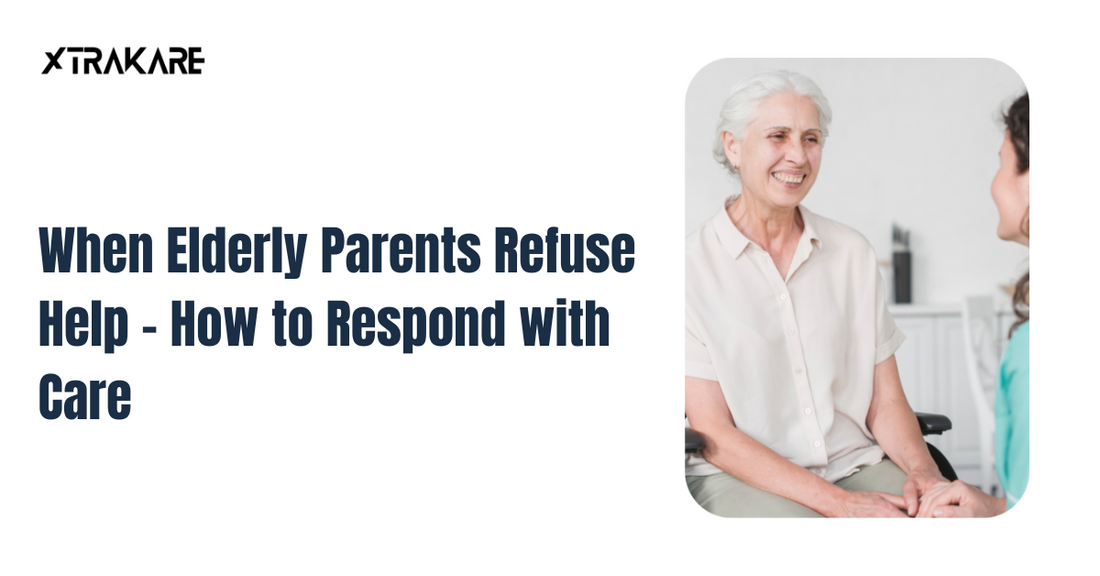
When Elderly Parents Refuse Help – How to Respond with Care
Share
“She Says She’s Fine”: What to Do When Aging Parents Refuse Help
When “I’m Fine” Isn’t Fine
If you’ve ever heard your mom say, “I’m fine, sweetheart, you don’t need to worry about me,” even after she forgot to take her medication or fell in the kitchen last week—you’re not alone.
In Omaha and across the country, adult children face the same painful scenario: your aging parent clearly needs help, but they insist everything is okay. And often, they mean it. But deep down, they may also be afraid—of losing independence, being a burden, or facing the reality of aging.
So, what do you do when a parent refuses help? How do you protect them without pushing them away? At Xtrakare, we support families through these conversations every day. Let’s walk through practical steps you can take.
1. Understand Why Seniors Say “I’m Fine”
Before trying to change your parent’s mind, it’s important to understand what’s behind the refusal. Most seniors aren’t being stubborn for the sake of it—they’re protecting themselves emotionally.
Common Reasons Seniors Refuse Help:
-
Fear of losing independence
-
Embarrassment or pride
-
Denial about their health or memory loss
-
Fear of being placed in a nursing home
-
Generational values around “toughing it out”
-
Worry about costs or being a burden
Understanding these emotional drivers helps you lead the conversation with empathy instead of frustration.
2. Look for the Subtle Signs They’re Not Actually “Fine”
If your parent won’t admit they’re struggling, pay attention to the small signs of decline:
-
Unpaid bills or unopened mail
-
Spoiled food in the fridge
-
Missed doctor appointments or medications
-
Unwashed clothes or dirty dishes piling up
-
New dents in the car
-
Bruises or unexplained injuries
Even if your parent insists nothing’s wrong, these are indicators that daily life is becoming harder, and intervention is needed.
3. Start the Conversation with Empathy, Not Control
Telling your mom she “needs help” often backfires. Instead, begin with non-threatening, collaborative language.
Conversation Starters:
-
“I’ve noticed the stairs have been harder for you lately. How can I help?”
-
“I know you want to stay independent—what would help make that easier?”
-
“You’ve always taken care of us. Let us return the favor a little.”
Avoid lecturing. Instead, invite them into the decision-making process.
4. Focus on Small, Practical Wins
Rather than pushing for full-time care right away, start small. Suggest one or two simple changes:
-
A weekly grocery delivery
-
A few hours of home care “just for cleaning or company”
-
A medication reminder app
-
A safety check or handrails installed “just in case”
Small, low-pressure steps help seniors adjust to the idea of receiving support without feeling like they’re giving up control.
5. Involve a Trusted Third Party
Sometimes hearing it from you doesn’t work—but hearing it from a neutral, trusted person can help.
Consider involving:
-
Their primary care doctor
-
A physical therapist or hospital discharge planner
-
A pastor or spiritual advisor
-
A family friend or relative they trust
-
A professional home care provider (for a free consult)
Having a professional voice often legitimizes the need for help and can soften resistance.
6. Reframe Home Care as Independence Support
One of the best ways to overcome resistance is to reframe care as freedom—not limitation.
Instead of:
-
“You need someone to help you.”
Say:
-
“This will help you stay in your home longer and avoid moving.”
-
“They can help with cooking so you can spend more time reading or with friends.”
-
“It’s like having a personal assistant for the things you don’t enjoy.”
At Xtrakare, we often explain that home care is not about taking over—it’s about supporting independence with dignity.
7. Prepare for the Long Game
Change doesn’t happen overnight. If your parent isn’t ready to accept help today, don’t give up. Keep checking in, watching for signs, and revisiting the conversation with care.
In many cases, seniors change their minds after a small crisis, such as:
-
A fall
-
A missed medication
-
A hospitalization
-
An overwhelmed family caregiver
Being ready in advance with a plan (and a trusted care provider) makes all the difference when that moment arrives.
Real Story: When “No” Became “Yes”
Mary’s dad in West Omaha kept saying he didn’t need help—even after a small kitchen fire. She arranged for a caregiver to come just “to check the smoke alarm and make lunch once a week.” Three months later, he was asking when his “buddy” was coming back to help with errands.
Sometimes the key is just getting a foot in the door.
Final Thoughts: It’s Not Just About Care—It’s About Trust
Convincing a parent to accept help is never easy—but with empathy, patience, and the right support, it’s possible. At the heart of every “I’m fine” is a person who wants to feel respected, safe, and loved.
✅ Ready to Start a Gentle Conversation?
Xtrakare offers free, no-pressure home care consultations in Omaha. We’ll talk with you—and your parent if they’re willing—to answer questions and explore light-touch care options.
📞 Call us today at 531-325-7170
📍 Proudly serving families across Omaha, Bellevue, Millard, and Elkhorn.
